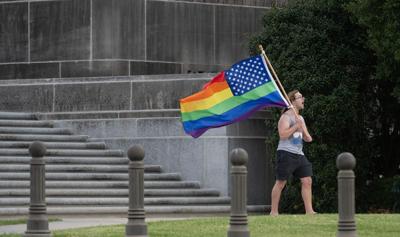The Louisiana Senate passed legislation Thursday afternoon to forbid school staffers from talking to students in grades K-12 about sexual orientation or gender identity.
House Bill 122 passed 28-7, with all Senate Republicans and two Democrats in support. It now heads to Gov. Jeff Landry, a Republican who has claimed without citing evidence that some teachers aim to indoctrinate students with “radical” ideas. Unlike his predecessor, a Democrat who vetoed an identical bill last year, Landry is expected to sign the measure into law.
Dubbed “Don’t Say Gay” by critics, Louisiana’s bill is broader than similar measures enacted by other Republican-led states. Louisiana is the only state except Florida to restrict such discussion in high schools, not just in elementary or middle schools. Louisiana’s bill also extends beyond the classroom, prohibiting school employees from discussing those topics during extracurricular, athletic or social activities — a provision critics say will prevent schools from hosting LGBTQ+ clubs and support groups.
Educators and advocates spoke out against the bill during a Senate committee hearing last week, saying the ban will send students the message that there is something wrong with LGBTQ+ people. Critics also say the bill, which forbids staffers from discussing their own sexuality or gender identity with students, would force LGBTQ+ teachers into the closet.
On Thursday, Sen. Royce Duplessis, D-New Orleans, pointed to a national survey that found about 40% of LGBTQ+ teens and young adults in 2023 had seriously considered attempting suicide in the past year. And nearly 2 in 3 LGBTQ+ youth said that hearing about “Don’t Say Gay” bans in schools made their mental health much worse, according to the same survey by The Trevor Project, a suicide-prevention group.
“Do you think that this bill could have any negative impacts on our LGBTQ young people who already have mental health challenges?” Duplessis asked.
Sen. Beth Mizell, R- Franklinton, said the bill’s intent was not to harm LGBTQ+ students but to make schools a “safe space” where parents know that staff won’t discuss sensitive topics with their children.
“For instance, if there is an LGBTQ employee, then the parents know I'm fine with that person because I know they're not going to talk to my child about their sexual orientation,” Mizel said, adding that she also would not want “a promiscuous male or female teacher” discussing their sexuality with students.
Duplessis proposed an amendment that would limit the bill to grades K-8 and allow teachers to discuss sexual orientation and gender identity in certain instances, such as when the topics come up in novels or anti-bullying programs. The amendment failed.
In the seven states that have passed similar laws, teachers have avoided references to LGBTQ+ people during history lessons and removed LGBTQ+ pride flags and pictures of their same-sex partners. Florida’s law faced legal challenges, leading to a settlement this year that clarifies that teachers may still discuss LGBTQ+ in class and that anti-bullying programs and LGBTQ+ clubs are still permitted.
Last week, the Louisiana Senate passed legislation that bans transgender people from using school restrooms that align with their gender identities. The Senate has not yet voted on a bill that would allow teachers to refuse to use students’ preferred gender pronouns even when students have their parents’ permission to identify as another gender.
The lawmaker behind HB 122, Rep. Dodie Horton, R- Haughton, also authored a bill to require all public schools and universities in the state to post the Ten Commandments. The Senate overwhelmingly approved that measure last week.
On Thursday, Duplessis said the ban on classroom discussions about sexual orientation and gender identity is unnecessary and harmful to LGBTQ+ students.
It “oppresses and stigmatizes young people who are struggling,” he said. “I don't think there's a need for this bill.”

